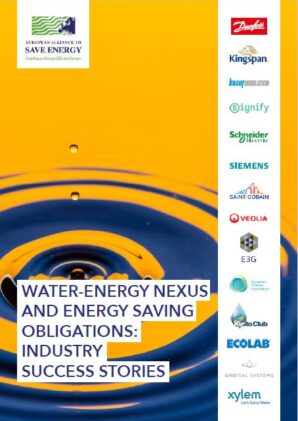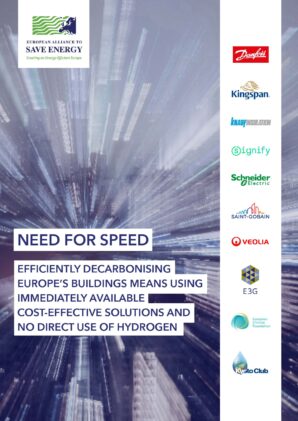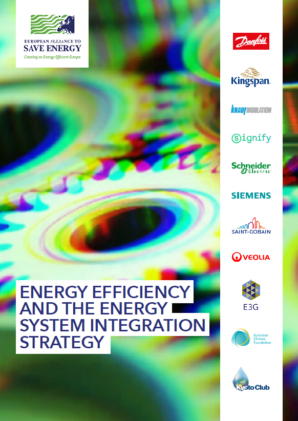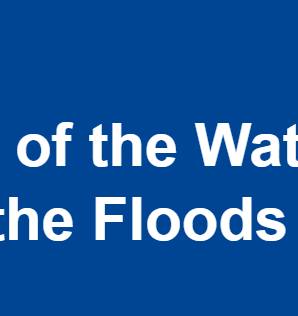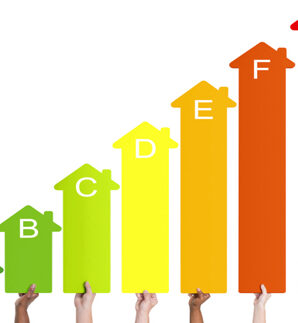Publications
Discover how we are contributing to a sustainable European Energy future
Papers
Water-energy nexus and energy saving obligations: industry success stories
This paper showcases concrete examples of water and energy saving projects across sectors and European countries. These feature some of the most advanced environmental technologies currently available on the market, allowing to deliver environmental, economic and social benefits. Water and energy are deeply entwined. The water-energy nexus refers to the relationship between how much energy is needed for abstracting, moving, heating, cooling, storing, treating and disposing water and how much...
read moreInputs for economic recovery, resilience and long-term sustainability
This short paper outlines the inputs of the European Alliance to Save Energy to achieve a green economic recovery, resilience and long-term sustainability in the aftermath of the Covid-19 pandemic. These include spending criteria and quota that should be applied in both the Recovery and Resilience Facility Regulation (RRF), currently being negotiated by the European Parliament and Council, as in the National Recovery and Resilience Plans (NRRPs). The paper calls for prioritising investments...
read moreDecarbonising Europe’s buildings with available solutions, no hydrogen
Meeting the EU’s goal of achieving a climate neutral economy by 2050 will require a steep reduction in gas demand, and such reduction will need to start before 2030. This means the EU should focus on immediately available and cost-effective solutions, starting from energy efficiency and renewables, especially for buildings. While green hydrogen can play a role in decarbonising the EU economy, its pathway comes with many uncertainties linked to the costs of its production, its inefficiency and...
read moreEnergy efficiency and the Energy System Integration Strategy
Reducing emissions across all sectors and decarbonizing “hard-to-abate sectors”, which include buildings, industry and transport, will strongly depend on the EU ability to apply the energy efficiency first principle, which should be mainstreamed to all energy policymaking, planning and investments, including into the upcoming EU Strategy on energy sector integration. Energy efficiency is the first fuel and should be the starting point for all decarbonization efforts, and this according to the...
read moreConsultations
Position on Fitness Check on the Water Framework Directive
EU-ASE is grateful for the opportunity to submit a response to this public consultation and welcomes the European Commission’s initiative to undertake a Fitness Check on the Water Framework Directive and the Floods Directive. EU-ASE believes that these REFIT Evaluation provide a timely opportunity to understand how these well-established legislations should be updated in light of the European long-term energy and climate strategy and increasing demands on Europe’s water resources. The...
read moreEU-ASE response to the public consultation on the “Revision of Directive 2012/27 EU on Energy Efficiency”
Article 1 provides the general framework for the promotion of energy efficiency within the Union in order to ensure the achievement of the EU 20% energy efficiency headline target by 2020. In addition and more specifically, Article 3 requires that each Member State sets an indicative national energy efficiency target based on either primary or final energy consumption, primary or final energy savings or energy intensity. In setting the targets, Member States should take into account a number...
read moreEU-ASE contribution to the public consultation on “A 2030 framework for climate and energy policies”
The 2020 framework was designed without a comprehensive assessment of the synergies and potential trade-offs between the three targets (as recognized by the Green Paper – page 7, 5th paragraph) and had only two binding targets: one for raising the share of energy consumption produced from renewables (RES) in the European Union (EU) and one for EU greenhouse gas (GHG) emissions reduction. The energy efficiency (EE) target, however, was not binding. In short, the framework is fragmented. This...
read more
